In the world that is entering a new development period with many profound changes, multilateral foreign relations, Vietnam faces the requirement to show the more comprehensive and far-reaching stature compared to the previous periods, to "proactively contribute to building and shaping common rules of the game", to demonstrate the spirit of "a responsible member in the international community", and to continue the efforts to fulfill important international commitments such as the commitment to completely join the World Trade Organization (WTO) in 2018, the Sustainable Development Goals 2030, the Paris Agreement on climate change; and ASEAN 2025.
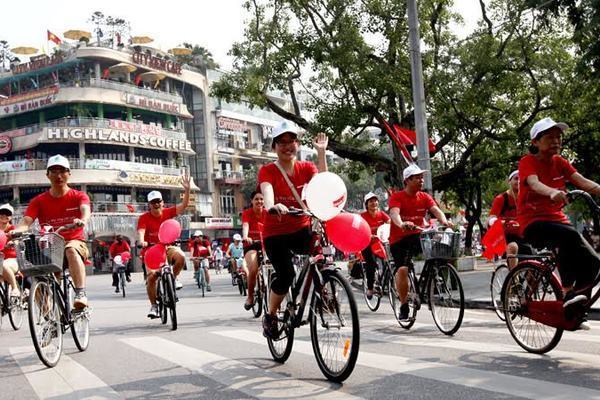 |
|
At the regional level, Vietnam is also an active participant in many activities within the framework of ASEAN on human rights.
|
Based on that situation, on August 8, 2018, the Secretariat issued Directive No. 25-CT/TW on promoting and enhancing multilateral foreign relations by 2030, the first guiding document of the Communist Party of Vietnam on multilateral foreign affairs of the country, making multilateral foreign affairs a task of the entire political system, an important strategic orientation land an effective way to successfully implement the two strategic missions of building and defending the country.
Directive No. 25 emphasizes: Vietnam will continue its participation, substantive contribution at multilateral forums on human rights; promote initiatives on Vietnam’s priorities, attract the international community’s support, especially for sustainable development, climate change response, ensuring the rights of the vulnerable group; integrate the contents to promote the country’s priorities and initiatives during the term of non-permanent membership of the UN Security Council (2020-2021), including initiatives on women and peace, security ...
Only a few days left we will enter the year 2020 and for the first time Vietnam will undertake the ASEAN Chairmanship 2020 and the non-permanent membership of the United Nations Security Council for the term 2020-2021. Vietnam identifies the theme "Cohesion and proactive adaptation" for the ASEAN Chairmanship Year 2020 and "Vietnam: A reliable partner for sustainable peace" when taking on the role of a non-permanent member of the United Nations Security Council in 2020-2021.
These topics demonstrate the consistent implementation of the country’s foreign policy of independence, autonomy, peace, cooperation and development; diversification and multilateralization in foreign relations; proactively and actively participating in international integration as proposed by the 12th Party Congress. They also demonstrate Vietnam's aspiration to contribute to peace and development in the region and the world as a responsible member of the international community, at the same time, making an important contribution to maintaining a peaceful and stable environment, taking advantage of more favorable conditions for the cause of national construction and defense, rapid, sustainable development and enhancing the role and position of our country in the world.
This is also one of the reasons that VietnamNet organizes a round-table talks with two guests: Professor, Dr. Pham Quang Minh, rector of the University of Social Sciences and Humanities and Ambassador Pham Quang Vinh, former Deputy Minister of Foreign Affairs.
The "key" of consensus
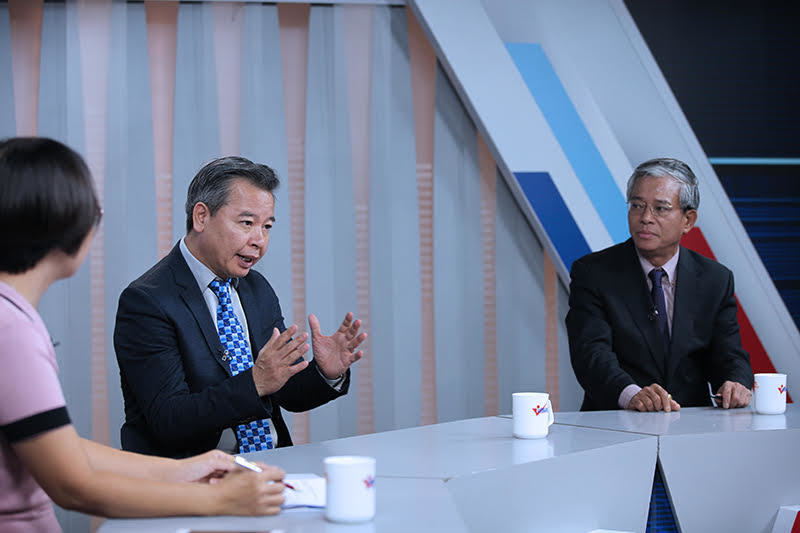 |
|
Photo: Prof. Pham Quang Minh, Rector of the University of Social Sciences and Humanities (left) and Ambassador Pham Quang Vinh, former Deputy Minister of Foreign Affairs (right).
|
Ambassador Pham Quang Vinh, how can you summarize the process of more than 5 decades of establishment and becoming a unified entity of ASEAN today?
Ambassador Pham Quang Vinh: First of all, ASEAN has grown from the first 5 countries to 10 Southeast Asian countries. Secondly, the core of ASEAN is an organization that can ensure a stable, peaceful environment and develop the region. Thirdly, I particularly emphasize ASEAN economic integration – how to turn the space of ASEAN with 10 countries into a common economic space.
In the past 50 years, ASEAN has developed from a very loose association of the region into an increasingly cohesive community based on three pillars: politics, security, culture and economy, contributing to the peaceful, stable environment and development of the whole region, of each member country, promoting international cooperation.
Professor Pham Quang Minh: In your opinion, what is the key to creating the success and strength of ASEAN?
Prof. Pham Quang Minh: I think the key is consensus. Born in 1967 at the height of the Cold War, ASEAN countries were also drawn and divided by the powers. But the first five members decided to form an association of Southeast Asian nations, creating opportunities for countries to work together and still opened to the rest.
In 1976, when the first summit was held in Bali, the principle of consensus and non-interference in internal affairs was defined in the Treaty of Amity and Cooperation in Southeast Asia (TAC).
Since then this principle has created a cohesion between ASEAN countries and created power, because ASEAN countries are both small and medium ones. And like the famous saying of Singapore's Foreign Minister S. Rajaratnam in 1967 that if we do not agree with each other, do not unite together, we will be destroyed one by one, exactly will be hanged one by one. Consensus, unity and cohesion are perhaps the most important for ASEAN.
How have these achievements helped ASEAN have a voice and position in the region as well as the world?
Prof. Phạm Quang Minh: I think ASEAN has now become the most successful regional organization. Previously, it was said that ASEAN was loose, but that looseness created a great resilience. In other words, ASEAN's weaknesses partly become one of the forces that kept ASEAN exists. Because the world changes so fast, if you stick to certain principles with a bulky structure, a multi-class organization like the European Union, it will be difficult for an organization including small and medium countries like ASEAN.
Ambassador Pham Quang Vinh: As Mr. Pham Quang Minh said, in a Southeast Asia region that has a history, even standing at both ends of the line in a war, with many differences in economics, culture and society can be united with one another, unanimously go together to become a community and continue to grow even though the regional and international environment changes a lot, it is a success that is difficult to achieve by any organization of the same conditions.
Ambassador Pham Quang Vinh, ASEAN is located at an important geographic location, a very large region connecting the Indian Ocean and Pacific Ocean. How has ASEAN promoted its central role in creating an open, transparent, inclusive and rule-based regional structure?
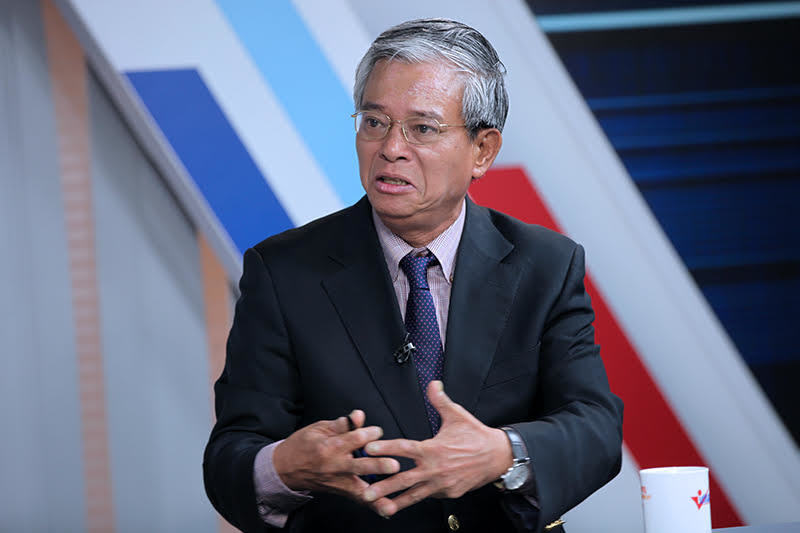 |
|
Ambassador Pham Quang Vinh.
|
Ambassador Pham Quang Vinh: The fact that ASEAN is located in such an important geostrategic regional center brings both advantages and challenges. The advantage is that it can play with many parties, many important partners, and this position draws many countries to this region. But at the same time, ASEAN must always deal with the competition of interests between other countries with them, between member countries and between them and ASEAN.
I see a few things that ASEAN can do. Firstly, ASEAN can play with all countries in its own way. It does not harm anyone but at the same time it can connect and create let’s other countries, including the big ones that are competing fiercely like China and the United States, see benefits in ASEAN to enter this region.
Secondly, ASEAN by its principle of creating a neutral environment, promoting cooperation and finding common denominators, even at times when the common denominator is small to be able to promote inside cooperation as well as cooperation between ASEAN and the outside.
Thirdly, in the history of more than 50 years of development, ASEAN has created forums and frameworks for cooperation. In addition to ASEAN, there are ASEAN + 1, ASEAN + 3, East Asia Summit or the Open ASEAN Ministerial Meeting, or the ASEAN Regional Forum (ARF)... All show that not only ASEAN reaches out to its partners, but other countries themselves join it as they realize their interests.
How has ASEAN promoted its central role? Firstly, it is certain that ASEAN must define its principles. And these principles create a consensus for ASEAN, so that ASEAN becomes a cohesive group to cooperate with partners.
And the third point is that in the competition between major countries, ASEAN must determine its position to play with other countries while asserting its principles, not accepting interference into the region’s affairs.
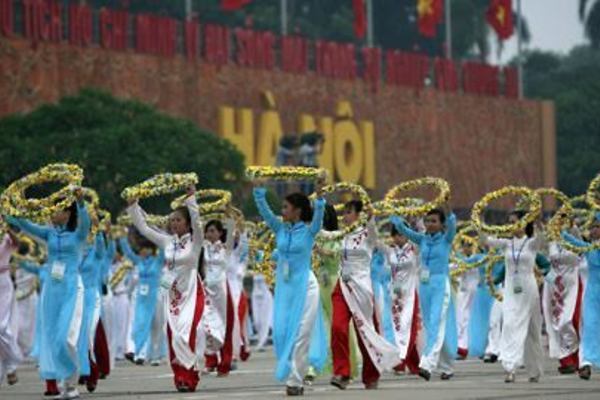 |
|
In 2019, at the UN Human Rights Council, Vietnam, Bangladesh and the Philippines introduced the Resolution on climate change and the rights of people with disabilities with 49 co-sponsors. Vietnam was the representative of ASEAN's voice in the events of the UN Human Rights Council on climate change and women's rights. Illustrative image.
|
Mr. Ambassador has just talked about ASEAN’s central role and its principles to reach agreement. However, is it right that harmonizing the mutually beneficial relations between the member states within the bloc as well as with the partner countries is not a simple task?
Ambassador Pham Quang Vinh: Definitely not that simple. It was not easy for ASEAN with 10 different countries could go together to build a community. They agree on the goal of building a community, but there are differences during the roadmap to that end. But the important thing is that ASEAN has created a process of exchanging with each other and then reaching an agreement.
But there is also the story of 10-country ASEAN interacting with external partners when they come here with many different goals, of course they value ASEAN, but they have their own benefits. So it is very important how ASEAN can unite.
Of course ASEAN has rules but the second one is that the 10 ASEAN countries also have common interests in engaging with external partners.
Thirdly, when problems with differences arise in ASEAN, it must be acknowledged as normal. Looking back on the past 50 years of history, especially the last 20 years of ASEAN development, there are many examples of how ASEAN countries are still different in their approach to problems and in relation to partners. They may soon reach consensus, but it may also take a process to reach consensus.
For example, in 2012, the 45th ASEAN Foreign Ministerial Meeting (AMM - 45) for the first time failed to issue a joint statement, but the reason was attributed to different approaches and views on the East Sea issue. But soon after a new consultation process, ASEAN issued a six-point statement on principles for the East Sea issue, including the more developed principles.
At the next meetings held in Laos and Malaysia in 2015 and 2016, despite great disagreement, but in the end, ASEAN did not repeat the failure of 2012.
Unity in diversity
Mr. Pham Quang Minh, what are the main forums ASEAN has initiated and how do these forums promote their role in the development of the ASEAN community?
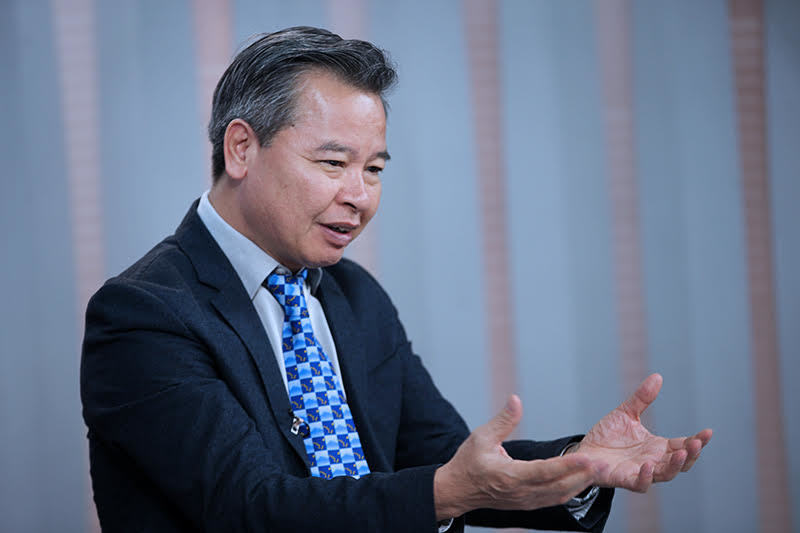 |
|
Prof. Pham Quang Minh
|
Prof. Pham Quang Minh: ASEAN exists because it has promoted its creativity and capacity. People highly appreciate ASEAN in giving out initiatives and standards. Looking back at its history from 1967 to present, there are countless important initiatives, from building Southeast Asia into a region without nuclear weapons, then a region of neutral peace and especially the regional security forum, called ARF for short, established in 1994.
|
At the open discussion of the United Nations on children and armed conflict, held on August 2nd in New York, speaking on behalf of ASEAN, Ambassador Dang Dinh Quy, Head of the Vietnam Permanent Mission to the UN, emphasized that although ASEAN recognizes progress, generally the situation of children in armed conflict is very worrying... ... The Ambassador affirmed that ASEAN always cares for and attaches importance to promoting efforts to ensure children's rights in armed conflicts at both national and regional levels through the activities such as the ASEAN Dialogue on the Convention on the Rights of the Child, The annual dialogue between the ASEAN Committee on the Promotion and Guarantee of Women's and Children's Rights and the Special Representative of the UN Secretary-General on Violence against Children ... The Ambassador also emphasized Vietnam's consistent stance of prioritizing the promotion and guarantee of children's rights. Vietnam will continue to join hands with the international community in efforts to protect children in armed conflicts. |
The ARF is very important because the history of ASEAN, of Southeast Asia and of Asia in general did not have a tradition of multilateral cooperation on security. We see mainly bilateral security agreements between the US and regional countries, not multilateral mechanism. In 1994, under the pressure of sovereignty disputes and non-traditional security issues, ASEAN launched an initiative to establish the ARF.
Three steps for the ARF were set out: the first step is to build trust, the second step is preventive diplomacy and the third step is resolving conflict. Many people said that since 1994, actually, the ARF has just stopped at step 1 and moved a little to step 2 or it still continues to build trust as trust has not yet built among the countries in this region.
When moving to step 2, it can be seen that diplomatic activities between countries are very strong with annual, bilateral and multilateral exchanges. But people are still skeptical of the ARF’s role in resolving conflicts. But I think the ARF at least creates an opportunity, a mechanism for dialogue for the parties who seem to be unable to sit down with each other.
There are many other mechanisms, such as the ADMM +, which was established in 2010 when Vietnam became ASEAN chair.
These mechanisms show it is important that ASEAN is always moving forward and always makes new initiatives. Perhaps these initiatives have not been implemented yet, but at least it creates playgrounds or mechanisms for the parties to have dialogue with each other, especially those with direct conflicts that cannot be reconciled.
It can be said that ASEAN plays a central and driving role in that place - bringing the parties together even though they have conflicts.
Prof. Pham Quang Minh just mentioned the story of building trust. It is true that many people doubt whether intra-regional solidarity is an ASEAN issue and whether it is dominated by outside countries. What is the view of Ambassador Pham Quang Vinh?
Ambassador Pham Quang Vinh: What we need to talk about is unity in diversity, as Professor Pham Quang Minh mentioned, instead of saying solidarity or loss of solidarity.
In the process of developing and dealing with issues related to ASEAN or interacting with other countries in ASEAN relations, there is difference. I prefer to look at it from a different perspective, the more clearly the problem for ASEAN and the region is bigger. And if we look back at recent years, more than 90% of ASEAN issues had a consensus. Building community, building standards, expanding relationships with partners, promoting initiatives of ASEAN in all areas including non-traditional security ... are the success of ASEAN but it is the things that few people mention.
There are also a few issues that there are different views among ASEAN member states, including the interaction between major countries to the East Sea issue that ASEAN has to argue more, which is a too big issue for this region, with ASEAN. But the important thing is that even though there is a big difference, they can still have a voice, and it is a very principled, very strong voice.
The second is the outside world must listen to the voice of ASEAN.
Thirdly, the stance of big countries over the East Sea conflict is different, they still come here with ASEAN. It can be seen that no matter how tough the issues are, the flows of diplomacy in ASEAN are constantly moving, which gives ASEAN the strength to keep the center position and be able to rise.
The difference is natural, but it is important to handle that difference while the unity is still maintained and ASEAN still shows its diversity and the outside countries still play with ASEAN, still attach importance to the role of ASEAN.
In your opinion, Mr. Ambassador, during its development process, can ASEAN overcome the temptations and delimitation between its own interests and the common interests of the community, as well as the common interests of the community and the interests of partner countries?
Ambassador Pham Quang Vinh: I think that for all ASEAN member states, in international relations in general and in ASEAN community, will consider the national interest, the benefit they gain from the association. In that process there are different sometimes and it is so important to recognize and handle those differences.
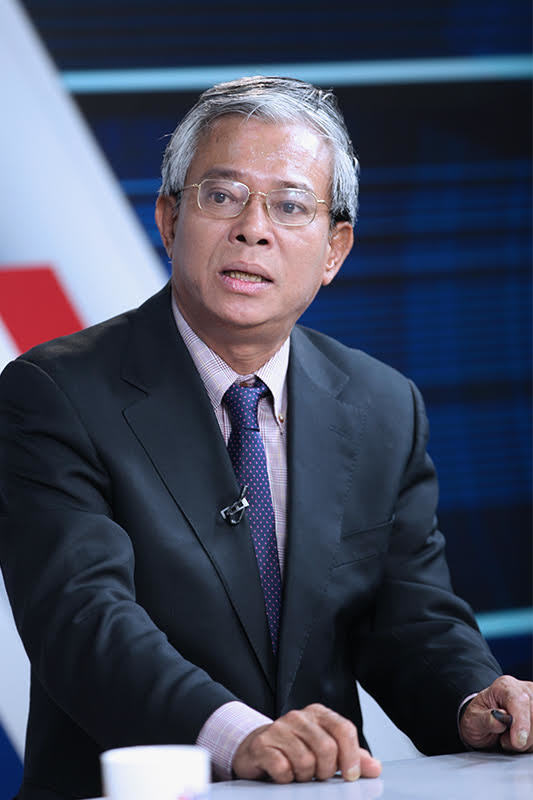 |
|
Ambassador Pham Quang Vinh.
|
I personally find that by the end of the 1990s when ASEAN completed the process of gathering all 10 Southeast Asian countries, many ASEAN countries recognized that the ASEAN membership benefits their national interests. Vietnam, Cambodia, Laos, Myanmar or the first member countries like Singapore, Malaysia, Philippines ... all see that. The harmonious combination between the nation and the region is always a test for each country and for ASEAN.
Secondly, on the path of ASEAN development, as each country gains more and more benefits in the process of ASEAN integration and in promoting its position through ASEAN, they will see more consensus in the interests with the area.
Prof. Pham Quang Minh: To summarize all the things that Ambassador Pham Quang Vinh has just explained into a word, that is the "ASEAN way" - the way ASEAN deals with contradictory and other conflicts and differences. ASEAN has never officially dealt with these issues and it is called the quiet diplomacy, which is different from the official diplomacy in countries of other regions.
We all know, in the tradition of Southeast Asian countries and Asia as a whole, the so-called “saving face” for each other is very important. So at the so-called formal events, conflicts are not brought up for discussion, but are often resolved on the sidelines, such as during the talks of ambassadors at a party, at events or at the golf course.
Mr. Quang Minh, so can it be considered a way for ASEAN to obtain today’s achievements and not repeat the Brexit situation as it happens for the EU?
Prof. Pham Quang Minh: That's right. Up to now, 52 years have passed and there have been a lot of ups and downs, difficulties in ASEAN. For example, one of those ups and downs was the East Sea issue at the 45th AMM in 2012 as Ambassador Pham Quang Vinh mentioned.
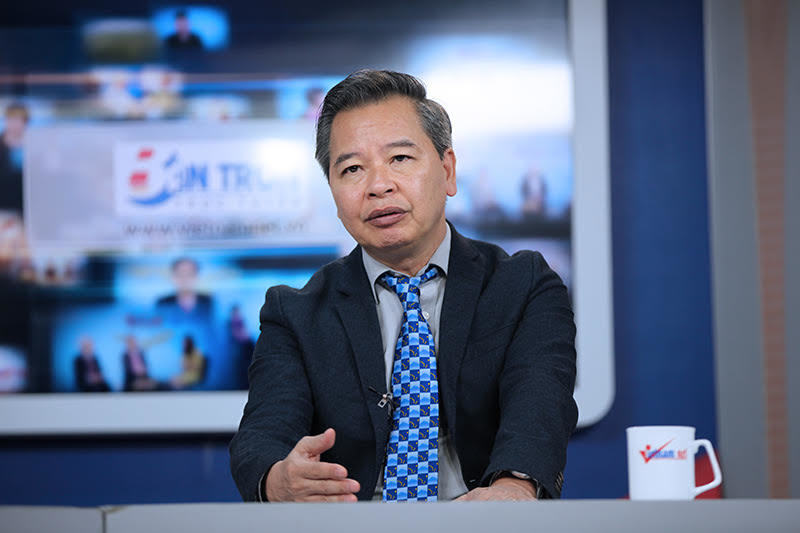 |
|
Prof. Pham Quang Minh.
|
I think the next challenge that ASEAN must overcome is to accomplish the goal of building a community based on three pillars of political security, economy and socio-culture. How to build ASEAN to be a community, an organization of the people, a people-centered organization, not an organization of officials or an organization with just political statements?
Secondly, in terms of economics, it is clear that ASEAN is one of the big economies, ranked among the top 10 in the world. It is necessary for ASEAN to strive for becoming the fourth largest economy in the world in the next few years.
Socially and culturally, this is a very diverse community. For example, the SEA Games, in my opinion, is a festival of ASEAN countries and a competition. And competition brings new impetus for development. Vietnamese football without a competitor like Thailand will always stay at the same place and Thailand, without an opponent like Vietnam, will be always the number one, right? The healthy competition from culture, society, sports will spread to the economy and other fields. And that is a good sign for a regional organization like ASEAN.
Ambassador Pham Quang Vinh, how should ASEAN behave in the current context when big countries have different voices, even disagreements?
Ambassador Pham Quang Vinh: It is not until now that major countries in relation to each other and in relations with this region have disagreements, but the level of competition has become fiercer and more open, especially the Sino-US relations.
In its tradition, ASEAN has always dealt with major countries, including with the rise of China and in relations with the US. That is, ASEAN must maintain its voice based on its own interests as a group of small countries in the region. Their voices and their role in the region must be recognized.
Secondly, before the China-US competition, ASEAN has also had a period of two or three years for discussion. One of the most desirable things for them is not to force them to choose this side or the other. ASEAN wants to have good relations with major countries, with China, with the United States and take advantage of the dual interests to work together to serve ASEAN and the region to have stability, peace and development.
Of course, ASEAN members still have different interactions with the big countries. Based on their national interests, different perspectives in dealing with regional issues may exist. But ASEAN members are small countries, they have common interests and do not want to be dragged into the engagement, confrontation between big countries. They want good relations with all parties and I think they will find a way to avoid the traps of competition between major countries.
Prof. Pham Quang Minh, which changes between the two sides have been revealed through Vietnam’s admission to the ASEAN?
Prof. Pham Quang Minh: I think in 1995 the discussion of joining ASEAN was certainly a topic of great debate, not only for Vietnam but also for ASEAN. Because from the former enemy, from hostility, doubt it became a member of the organization. It is a process of awareness changing. The member countries of ASEAN were US allies in the Vietnam War. In contrast, the members of ASEAN at that time also saw Vietnam with an eye that was not friendly, reliable because it was clear that Vietnam was a country with another political regime.
But in 1995 there was a common thing from both sides. Vietnam recognized ASEAN as a real organization with the principles of neutral peace, strong economic development and good international cooperation. The outside saw that Vietnam had had a 10-year renovation process since 1986, from a centrally subsidized economy to a market economy. They saw Vietnam a huge market.
Ambassador Pham Quang Vinh, when Vietnam joins ASEAN, what do Vietnamese people benefit?
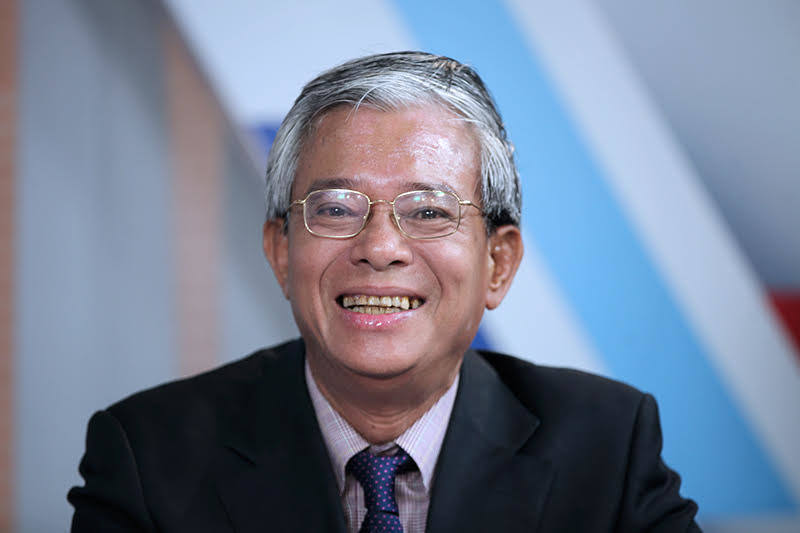 |
|
Ambassador Pham Quang Vinh.
|
Ambassador Pham Quang Vinh: ASEAN is striving to build a community towards people and Vietnam's participation in this region has created strong exchanges between people in the region across all sectors, not only political security but also business opportunities, economic development, education exchange, sports and tourism, etc.
For example, it is clear that people now travel within ASEAN very easily. We can fly to Singapore, to Malaysia, Thailand ... for travel, health treatment, visiting relatives, doing business ... without having to apply for a visa. I remember that in the 1980s it took a long time to get a visa.
Exchange of students between countries is also an important field. Many Vietnamese students are studying in Singapore or Malaysia.
In terms of sports, for every football match of Vietnam, held in other countries in the region, a lot of Vietnamese fans can go there for cheering. It is the facilitation of exchanges between people in ASEAN that the policy environment, including visa policy, brings about.
Mr. Pham Quang Minh, as the President of the University of Social Sciences and Humanity, could you talk more about the exchange of education among ASEAN schools?
Prof. Pham Quang Minh: Among the three pillars of the ASEAN community – politics, security economics-culture, it is true that we have to pay more attention to the cultural and society pillars.
We see many big changes in the field of education.
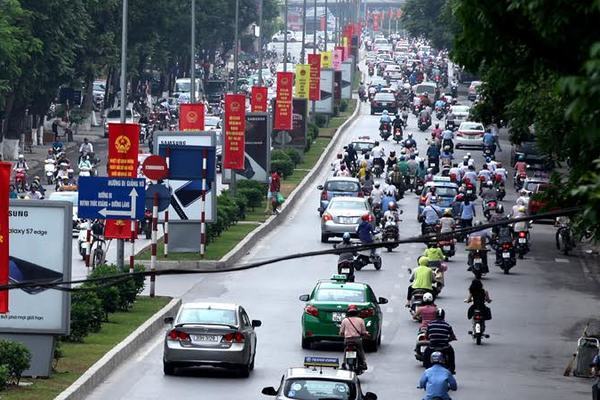 |
|
The theme "Integrity and Adaptive Adaptation" has been chosen by Vietnam as the ASEAN Chairman in 2020.
|
Our school has officially offered the Southeast Asia studies for the past 2 years and nearly 100 students have enrolled in this field every year. The Indonesian ambassador to Vietnam, Mr. Ibnu Hadi, has sent Indonesian language teachers to my school. In the past two years, many students have signed up to study Indonesian language.
As for Thai language, it has been taught in the school for 10 years. Thai universities often send students to our school to study and exchange.
Recently, Vietnamese ambassador to Cambodia Vu Quang Minh sent a note to our school asking us to welcome a delegation of 80 students from the Royal Phnom Penh University to exchange with the theme “The role of Southeast Asian youth, especially Cambodian and Vietnamese, in the process of building an ASEAN community”.
Surprisingly, in the previous period we focused our attention on the regions such as Latin America, Europe and Africa and forgot our neighbors. Now in Vietnam's foreign policy, Southeast Asia must be one of the top priorities. To understand each other and work together, they must firstly understand the language of each others. Language is like a key and it is necessary to promote and strengthen the teaching of languages of Southeast Asian countries in regional universities.
It can be said that Southeast Asian countries do not pay adequate attention to each other's education issues. This also reflects the outward trend of ASEAN. For example, in terms of economics, intra-regional exchange has been nearly 25% after more than 50 years or only nearly 1/4 of the total trade value of ASEAN countries. The remaining 75% is with external partners such as the USA, China, the EU, Japan, South Korea, Australia, and India.
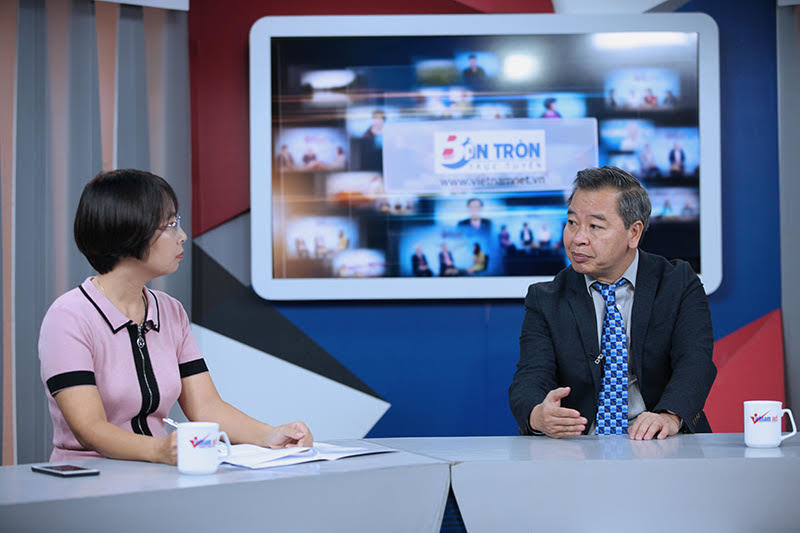 |
|
Prof. Pham Quang Minh
|
Ambassador Pham Quang Vinh, how do you evaluate the role of ASEAN in helping Vietnam to improve its international integration capacity, institutional building capacity as well as dealing with transnational issues?
Ambassador Pham Quang Vinh: Until 1995, it was true that ASEAN was the first door for our economic integration with the world when we joined the ASEAN Free Trade Agreement (AFTA), regulations on economic incentives, and building economic community in ASEAN at the time. After gaining experience from joining ASEAN, we expanded our participation in the World Trade Organization (WTO) and later FTAs.
The story is very different now. Clearly, we have caught up with many goals including economic integration in ASEAN, and may also be a driving force for ASEAN's overall economic development. In the past 10 years, there have been political and security fluctuations in the region, including the competition among powers as we have just mentioned, economic fluctuations such as the most recent crisis in the late 2009-2010. But Vietnam is still one of the stable economies, maintaining macro stability and relatively high GDP growth rate.
Regional integration has given us lessons to reach out to the sea. But in the current period, when we have integrated deeply and comprehensively in both the region and the world, we have brought to the region a higher level of integration and more favorable development.
Secondly, we have a system of economic relations and integration with the world, including new-generation FTAs, which is a great advantage for the supply chains in ASEAN and the region to link with the broader supply chains, to the world.
Intra-ASEAN trade is only 23-24% (1/4). To increase this rate, countries must develop stronger and move towards higher integration. They will have space for more extensive exchange. On the other hand, this internal block must become a supply chain attached to the global supply chain.
The context of the world and the region is changing complicatedly, while ASEAN has 10 different members with different identities, personalities and interests. How has Vietnam participated in resolving the pillar of political security with the spirit of building a strong, peaceful and stable ASEAN community, Mr. Pham Quang Minh?
Prof. Pham Quang Minh: Political security is a top issue and is also a top concern of Vietnam. Recalling Vietnam's foreign policy since 1988 with Resolution 13 of the Politburo, it has determined that we want a peaceful and stable environment to carry out internal economic reform. More than 30 years have passed, Vietnam has tried its best to work together with ASEAN countries to ensure a peaceful region. It can be said that it is the greatest success of ASEAN, with the contribution of each member.
Therefore, it must be emphasized that ASEAN's security is a common issue, not only traditional security but also non-traditional security. Because traditional security, the issue of sovereignty is a long story, but non-traditional security issues, such as fishing in the sea or environmental issues and human trafficking ... are something that take place everyday, and ASEAN cannot forget it as non-traditional security issues can easily lead to conflicts.
Secondly, Vietnam not only contributes by action, but also by ideas and determination to preserve peace. For example, in 2002, facing the East Sea conflict ASEAN still issued a Declaration on the conduct of parties in the East Sea. Indeed, it is an achievement that Vietnam is one of the countries with very important contributions. And Vietnam is also one of the countries that have launched many initiatives to complete the Code of Conduct in the East Sea. That is the great effort to show that Vietnam is an active, responsible member.
Mr. Pham Quang Vinh, what are your views on Vietnam's role in addressing ASEAN's burning issues, especially the East Sea conflict?
Ambassador Pham Quang Vinh: There are some things related to the East Sea so that we can better recognize the role of ASEAN.
 |
|
Ambassador Pham Quang Vinh
|
Firstly, in this region, peace, security and freedom of navigation are the interests of the whole region and all countries in the world. So, in recent years, not only ASEAN has its voice about this, but it has also linked with other countries so that they can contribute to building a stable peace environment here.
Secondly, this area has overlaps and sovereignty disputes. ASEAN's principle is to resolve conflicts by peaceful means, based on international law, especially the 1982 UN Convention on the Law of the Sea (UNCLOS 1982).
And thirdly, there are developments in the East Sea that make the situation more complicated. Therefore, the process of building trust is very important. I think that this trust-building dialogue is not only for strengthening mutual understanding but also for establishing standards of conduct here. ASEAN's behavior has sometimes been judged as "too soft" or not keeping up with the situation. But at least ASEAN has retained its voice in the region’s issues.
Prof. Pham Quang Minh, we have talked quite a lot about the pillar of political security, but what are the initiatives that Vietnam has to promote intra-regional trade towards an ASEAN without barriers?
Prof. Pham Quang Minh: This is a two-sided process: internal innovation in terms of economy and integration. We must innovate economically by joining free trade agreements. For example, Vietnam has signed free trade agreements with major ASEAN partners, such as China, Japan, South Korea and India. At the same time, we also participate in the region's largest free trade agreement, the Regional Comprehensive Economic Partnership (RCEP), which is expected to be completed this year.
Vietnam is committed by its own efforts, which is bigger than that of other countries, because we are an economy transitioning from a centrally planned subsidized model to a market economy. The amount of goods that we pledge to open and integrate into the ASEAN free trade area is up to 97%.
The important thing regarding the economic aspect, as Ambassador Pham Quang Vinh mentioned, is that we must join the global value chain.
Back to the story of why intra-ASEAN trade only accounts for a quarter of total trade. The economies of ASEAN countries are small and medium-sized and they compete with each other so they have to find external partners. Both Vietnam and Thailand produces rice. Vietnam produces rubber and Indonesia also produces rubber.
Economically, it is good that ASEAN gives priority to eight sectors that allow for a shift in labor, such as dentistry, tourism, logistics, etc. ASEAN has considered very carefully to create a common production base, rather than a common market as in the European Union. This is the first step to create a gradual integration so that the least developed and less developed member countries can still integrate in a stable without creating confusion.
I think this is suitable for Vietnam. Vietnam and other countries are trying to create a major economic change and narrow the development gap. ASEAN 4 and ASEAN 6 are gradually narrowing the gap, and if the RCEP is completed, it will create a new momentum for Vietnam's economy. Vietnam has made great efforts not only in RCEP but also the Comprehensive and Progressive Agreement for Trans-Pacific Partnership (CPTPP).
Challenges intertwine with opportunities
In 2020 Vietnam will celebrate its 25th anniversary of ASEAN membership and will assume the rotating chairmanship of the Association. What has Vietnam prepared for this important milestone, Ambassador Pham Quang Vinh?
|
Multilateral cooperation in education and training is promoted: * Within the framework of the EU, ASEM, APEC on the basis of the cooperation and partnership agreements between Vietnam and the European Union on educational cooperation, annually a large number of Vietnamese students go to European countries for study under scholarship and student exchange programs. The Erasmus Mundus Scholarship Program (EM) is an opportunity to access high-level academic exchanges, share ideas and interact with the academic community around the world as well as gain in-depth knowledge about life in Europe. Through partnership projects, universities in Vietnam have established networks and links with EU universities, improved teaching quality and built mechanisms to support exchange and recognition of degrees. The EU and Vietnam have agreed to promote cooperation in the field of higher education and consider this a priority in the Cooperation and Partnership Agreement, so the EM is the European Union’s contribution to this priority. . * Cooperation within the framework of ASEAN has achieved impressive results, affirming Vietnam's important role and position in the year it held the SEAMEC chairmanship, implementing the results of the ASEAN Joint Declaration on Higher Education, formulating and actively implementing the ASEAN Scheme, ASEAN Reference Level Framework ... Human resources development in the framework of cooperation among CLMV countries (Cambodia, Laos, Myanmar and Vietnam), ASEAN, ASEM, EU, APEC have been promoted. Vietnam has effectively used aid and assistance from the UN, UNESCO, UNICEF, GPE, non-governmental organizations and the WB, ADB and financial institutions for preschool, general education development and resources from developed nations for the programs to enhance the quality of higher education, ensuring the implementation of the guidelines and strategies for education innovation and development in Vietnam. |
Ambassador Pham Quang Vinh: I think Vietnam has prepared at both levels, the first is policy and position and the other is specific preparations. In the past few decades of renovation, especially in the past 10 years, Vietnam has made very long strides. The first is economic, political strength and the strength in other areas thanks to the innovation process. Secondly, Vietnam has not only integrated in ASEAN but also into the world as it has participated in FTAs of high quality and higher standards.
But most importantly, the international situation in recent years and in the year after we will chair ASEAN will continue to fluctuate in all aspects, including geostrategic competition with major countries. This creates new security challenges for the region. That competition will create instability, which is also a challenge for development in this region. Most of the countries in the region are export-oriented, so how will be the impacts of this competition and the increase of protectionism on member countries and the regional economy?
Thirdly, amidst all these uncertainties, the building of an ASEAN community must continue. We have prepared the mind so we have set out the theme of ASEAN 2020 "Cohesion and Active Adaptation".
As for specific preparation, a year ago we established a national committee and reviewed all aspects of preparation both in terms of content, logistics and technical security. We have organized international conferences and our staff are much more professional so we will definitely fulfill our responsibilities as ASEAN chairman.
Could you clarify the challenges and difficulties when Vietnam takes on the role of rotating chairman?
 |
|
Ambassador Pham Quang Vinh
|
Ambassador Pham Quang Vinh: I think the biggest challenge is the internal challenge of ASEAN. So far, ASEAN has come a long way to be considered successful and as the president, we must maintain that success. Meanwhile, ASEAN is entering a higher stage of integration, that places requirements for domestic reform.
Secondly, facing the competition between the big countries, to maintain ASEAN’s unity, Vietnam – as the ASEAN chairman – must promote consultation with countries to find common denominators.
Thirdly, both challenges and opportunities will intertwine when the world economy is transformed under the digital and scientific revolution. Without achieving this, ASEAN cannot progress and each member state will lag behind the world. However, not every country is ready for the digital economy.
Prof. Pham Quang Minh: As Ambassador Pham Quang Vinh has said, there are a lot of challenges, but in challenges, there are also opportunities.
Politically, compared to other countries in the region, we have a relatively stable politics, Vietnam’s prestige and position has been improved. Other countries support Vietnam and they are ready to assist us in fulfilling the role of the ASEAN chair.
Next year Vietnam will hold not only the ASEAN chairmanship but also the non-permanent membership of the UN Security Council for the second time. These two tasks support each other. If we do at the regional level, it will support the international, global level and vice versa.
Secondly, in terms of economy, it can be said that over the past 30 years of renovation, Vietnam's economic success has been very clear. From a centralized, bureaucrically subsidized economy we have moved to a market economy. The average per capital income rose from less than $200/person to more than $2,000. We have attracted a large amount of FDI, trade and exports reached an unprecedented level of hundred billion US dollars a year.
It is the same for the socio-cultural aspects. The restoration of cultural values and vitality of culture is clearly shown in the new context, when cultural values are still protected.
Such common political, economic and cultural victories enhance Vietnam's prestige and position in the international arena. We have become more confident after assuming the ASEAN chairmanship in 2010, hosting many summits.
Therefore, I think the theme proposed by Prime Minister Nguyen Xuan Phuc "cohesion and proactive adaptation" is very appropriate, showing that our concern must still be ASEAN's community cohesion because there still exist differences and concerns about the impact of major countries. Cohesion will bring success to the whole association and "proactive adaptation" is because the world is changing very fast during the industrial revolution 4.0. Bringing up the topic that wins other countries’ agreement is also an advantage for us to successfully assume the role of ASEAN chairmanship in 2020, despite many challenges.
What are the top 3 benefits of Vietnam when it joins ASEAN, Ambassador Pham Quang Vinh?
Ambassador Pham Quang Vinh: I think the story here is interactive. Firstly, Vietnam gives priority and attaches importance to ASEAN because its highest interest is through this closest environment to build a stable environment for peace and development cooperation.
Secondly, along with ASEAN, through ASEAN, we contribute to integration and vice versa integration helps Vietnam to expand its integration into the region and the world.
The third is to improve our position and prestige. We contribute to ASEAN, ASEAN creates prestige, then through ASEAN we also improve our prestige.
Prof. Pham Quang Minh: The benefits for Vietnam are certainly great. Back to 1995, the prestige and position of Vietnam were still very low. People still doubted or were afraid about Vietnam as a new member of ASEAN. At that time, we did not understand ASEAN very much. After a quarter of a century as a member of ASEAN, politically we have created a peaceful and stable environment for development. Economically, among the top 5 foreign direct investors in Vietnam is Singapore. The relations with regional countries such as Thailand, Indonesia ... are also very potential. This creates the future development platform.
Opportunities for Vietnam's marine economy are also great. We engage in a sea space where the free and open Indo-Pacific strategy is definitely an opportunity.
As for social-cultural aspects, it is obviously a great success when we still assert our identity in the integration process, creating ASEAN's vision, community and identity. Why do ASEAN and Vietnam support each other so strongly? This is because there is sharing, similarity in benefits, equality, and appropriate level. If someone still thinks that ASEAN is just a talk show, just a place where people come to meet each other and come back to continue their work, and commitment are very loose, that's wrong. I think that we must change the perception, and the change the perception about ASEAN in the past 25 years is a huge success of Vietnam.
|
Vietnam has actively participated in the formation and operation of the ASEAN Intergovernmental Commission on Human Rights (AICHR), established in October 2009, and other ASEAN agencies related to human rights such as the ASEAN Committee for Guarantee and Promotion of the Rights of Women and Children (ACWC), the ASEAN Committee on Migrant Labor (ACMW), thereby contributing to building a common voice and approach to human rights cooperation in the region and the process of building the ASEAN Community. In particular, Vietnam has actively contributed in drafting the ASEAN Human Rights Declaration, adopted by senior leaders of ASEAN countries in November 2012. This is the first document outlining the framework for strengthening cooperation and the protection of human rights in the region, as well as the commitment of ASEAN countries to respect and guarantee fundamental rights and freedoms. Vietnam is actively promoting the implementation of cooperation programs and projects between the AICHR and the EU within the framework of the ASEAN-EU Regional Dialogue Program (READI). (Excerpt from the White Paper on Human Rights - 2018) |
Ladies and gentlemen, the talks partly helps us better understand ASEAN as well as the process of Vietnam's participation in ASEAN and Vietnam's preparations for 2020 when it takes the ASEAN chairmanship. Thank you our guests for joining VietNamNet today.
VietNamNet
 In 2020, for the first time, Vietnam is honored to take on the ASEAN Chairmanship and the non-permanent membership of the United Nations Security Council for the term 2020-2021.
In 2020, for the first time, Vietnam is honored to take on the ASEAN Chairmanship and the non-permanent membership of the United Nations Security Council for the term 2020-2021.